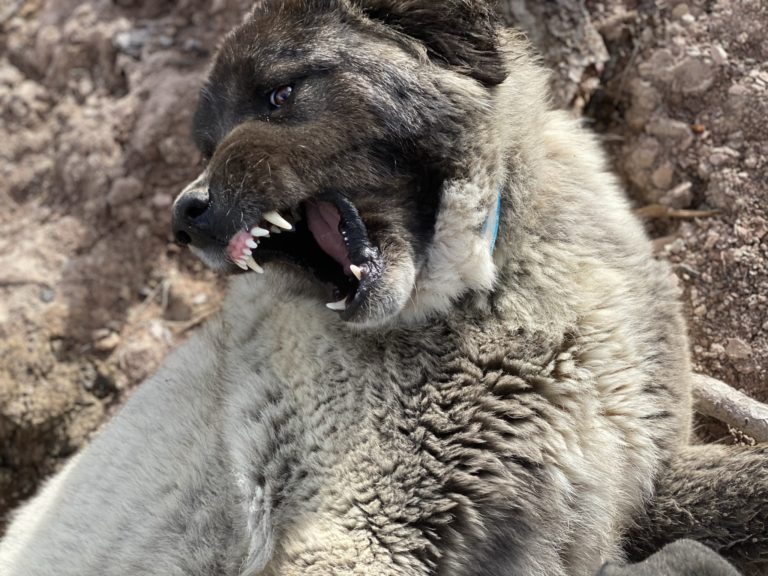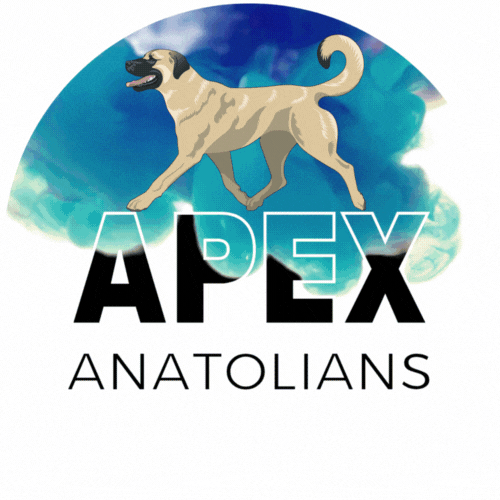
First, let’s define Aggressive…
ag·gres·sive/əˈɡresiv/adjectiveadjective: aggressive
- ready or likely to attack or confront; characterized by or resulting from aggression.”he’s very uncooperative and aggressive” And according to AKC “Aggression is hostile, injurious, or destructive behavior toward an individual, whether human or another animal.”
By these definitions, Anatolians could be considered “aggressive” when they are provoked. Part of their purpose in life is to defend livestock and their shepherds from outside threats, whether they have four legs or two.
I would like to clarify, however, that the behavior Anatolians most often display is defensive in nature rather than offensive. This means that they are reacting to stimuli that threaten or otherwise trigger a “danger” warning for the ASD. In an unsocialized dog, triggers can include people who look or dress differently than the humans the dog knows and sees regularly. And even the most socialized and calm Anatolians can react poorly to impaired people (medical or chemicallty induced) of all kinds, people or animals who cross boundary thresholds without proper introduction or escort, and any unknown animals.
The Anatolian is made for country living and the defense of stock and home. This defense drive can sometimes be excessive or cause concern/conflict when these dogs are kept as pets in a small holding/property setting.
I believe that appropriate aggression is a great tool when in the proper setting and under control. Problems arise when an owner/handler is unable to control or predict their dog’s aggression, regardless of the situational merits, the dog will inevitably suffer the brunt of the consequences.
If you have an Anatolian Shepherd dog who is proving harder to manage as they hit the 18-36 month age range, seek the assistance of an experienced dog trainer, and always begin training OFF your property/regular spots.
Owning an Anatolian Shepherd is a big responsibility, and it can require some management techniques that your average pet dog breed does not. For example, to prevent conflict and stress, it is recommended to crate train your Anatolian. That way, if you have someone come to work your livestock or visit your home (for family dogs), your dog has a safe, comfortable place to be whilst the potentially threatening person/activity takes place. This is ideal for all involved- including your dog!
There are also more specific forms of aggression seen in Anatolian Shepherd dogs that warrant a bit more explanation.
Same-Sex Aggression (SSA)
When a dog is reactive to other dogs of its same sex (male/male or female/female).
Same-Sex aggression can be redirected towards humans who attempt to break up a fight or deescalate conflict, but that doesn’t make it Human Aggression (HA). This is most common when a dog comes into sexual maturity and becomes affected by hormonal swings. Females in heat are a common trigger for both dog fights and bitch fights. However, once a pair of dogs decide they need to fight- they may continue on even after the hormones have settled. The key here is to know your dogs and have a plan to separate and “lock down” your females when in heat from first sign of red and the next month or so.
This type of aggression is more common in Anatolians and is acceptable to a point. SSA creates a management situation involving total separation of certain dogs from one another and sometimes from all other dogs. Mismanagement of SSA dogs can result in injury and even death of one or more of your dogs. Typically, SSA shows warning signs you can watch for, and many dogs are labeled SSA when they are simply not getting along with another same-sex dog in the pack.
Human Aggression (HA)
This is when an unprovoked dog is reactive towards humans, whether that means a specific person or strangers in general. This is a more serious form of aggression that comes with higher liability for the owner. We do not keep HA dogs, and we don’t recommend getting an Anatolian from a line known for reactivity or aggression towards humans without good reason.
Example of NON-HA: A dog in its pasture or yard barking and snarling at a stranger is not a human aggressive dog. That dog is defending its territory/stock and attempting to dissuade the threat. The presence of an unknown human or animal in/near the Anatolian’s territory is seen as a threat and this is not an unprovoked response.
A Human Aggressive dog will stalk, attack, single out, or otherwise target a human who has done nothing to deserve the dog’s attention. Existing in a public space or on property under the supervision of the dog’s owner/handler is not a reason for any dog to attack a human.
Anatolian Shepherds can have neither, one, or both Same-Sex Aggression and Human Aggression. While HA precludes a dog from being bred at Apex Anatolians, many other kennels see this as a “breed trait” so be on the lookout for that opinion as you research breeders. SSA is not as serious, often resulting from a temperament mismatch rather than an actual case of a dog hating all other members of its own sex. All these things figure into breeding decisions as we aim to produce balanced Anatolian Shepherd dogs in both mind and body.
